We left Jitter 101 talking about digital signals. However, error correction and design margins mean jitter on the digital bit stream is rarely an issue for the bit rates used for A/V systems. (At 10 Gb/s and above, it is a bigger issue.) When jitter is brought up as an issue in the audio world, we are talking about jitter on the sampling clock. This can happen for all the reasons mentioned before, but once that clock is used to drive your DAC, the jitter goes right to your ears (OK, there are a few steps along the way, but you get the idea).
Clock recovery is a complicated subject beyond the scope of this thread. Let’s just say getting a very clean, low-jitter clock takes some effort. As a result, jitter can run pretty high (several ns or more) in many audio systems. Make it an A/V system with videophiles defining the clocks and not worrying too much about audio, throw in a bunch of various digital signals around the audio bit stream and clock lines, and Bad Things can happen, like signal coupling and excessive jitter.
First, I am going to repeat some information from an earlier post. To see the impact of jitter, let's look at a 16-bit converter sampling at 44.1 kS/s (CD resolution and rate). The DAC is ideal except for the added random timing jitter. A perfect 16-bit ADC has SNR of about 98 dB. I have plotted the SNR vs. jitter for 100 Hz, 1 kHz, 2 kHz, 10 kHz, and 20 kHz signals. You can clearly see how the higher frequencies are much more sensitive to jitter. At 100 Hz, 10 ns of jitter is hardly noticeable, but at just 1 kHz the SNR has decreased by nearly 20 dB (down about 3 bits)! At 20 kHz, we have SNR less than an ideal 10-bit DAC (< 60 dB).
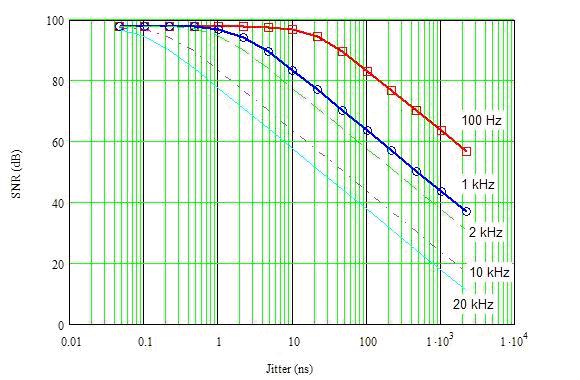
Another way to look at the impact is to plot the SNR lost as jitter increases, as shown below. A perfect 16-bit DAC would lose 0 dB in SNR; as jitter increases, more and more SNR is lost. With 1 ns of random jitter, things don't look too bad through 2 kHz, but at 20 kHz we see that 20 dB SNR loss. To keep the loss to just a few dB at 20 kHz, we need jitter < 100 ps; with just 1 ns of random jitter the upper midrange and high end is getting pretty noisy, with the effective dynamic range reduced by 10 to 20 dB.
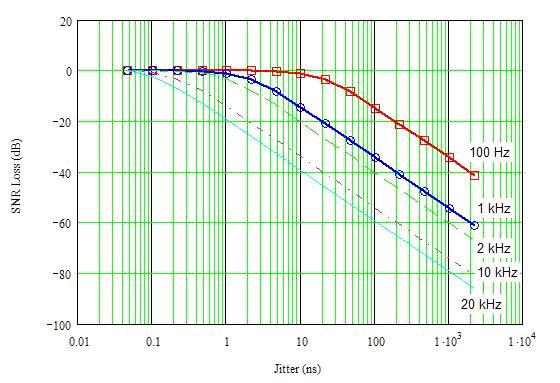
I did run a few test cases so we can look at frequency spectrums. (For the geeks: the input frequency is chosen relatively prime and bounded with the sample record to minimize spectral leakage per IEEE Standard 1241.) First, the ideal 16-bit DAC with a full-scale 1 kHz input signal:
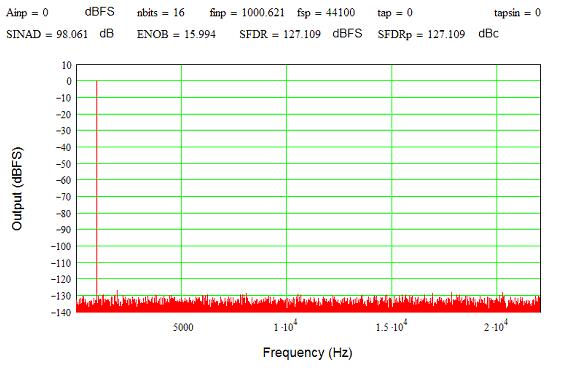
Now with 1 lsb (4.9 ns, standard deviation, normal distribution) of added random jitter we’ve lost about 1.5 bits of resolution (from 16 effective number of bits (ENOB) to 14.6 ENOB) and about 8 dB of SNR; spurious-free dynamic range is lower but still very high. Note only the noise floor is raised; random jitter will not generally add discrete tones, just more noise.
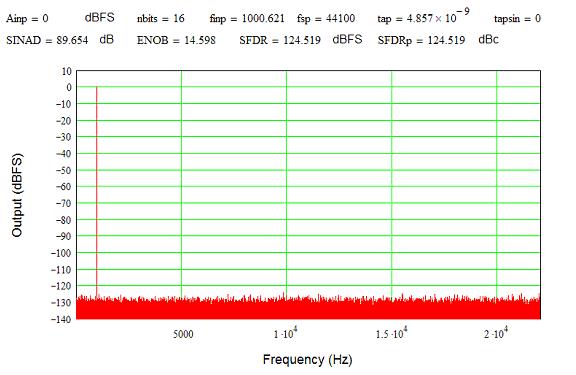
Here’s what happens we when double the random jitter:
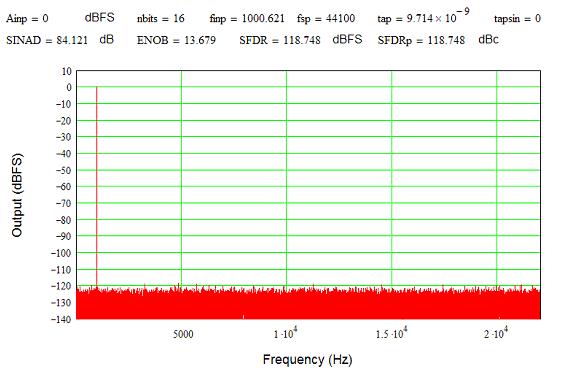
Lost another bit, but still a very low noise floor (84 dB SNR).
Oops, only 5 attached pictures allowed per post! Go to Jitter 102B...
Clock recovery is a complicated subject beyond the scope of this thread. Let’s just say getting a very clean, low-jitter clock takes some effort. As a result, jitter can run pretty high (several ns or more) in many audio systems. Make it an A/V system with videophiles defining the clocks and not worrying too much about audio, throw in a bunch of various digital signals around the audio bit stream and clock lines, and Bad Things can happen, like signal coupling and excessive jitter.
First, I am going to repeat some information from an earlier post. To see the impact of jitter, let's look at a 16-bit converter sampling at 44.1 kS/s (CD resolution and rate). The DAC is ideal except for the added random timing jitter. A perfect 16-bit ADC has SNR of about 98 dB. I have plotted the SNR vs. jitter for 100 Hz, 1 kHz, 2 kHz, 10 kHz, and 20 kHz signals. You can clearly see how the higher frequencies are much more sensitive to jitter. At 100 Hz, 10 ns of jitter is hardly noticeable, but at just 1 kHz the SNR has decreased by nearly 20 dB (down about 3 bits)! At 20 kHz, we have SNR less than an ideal 10-bit DAC (< 60 dB).

Another way to look at the impact is to plot the SNR lost as jitter increases, as shown below. A perfect 16-bit DAC would lose 0 dB in SNR; as jitter increases, more and more SNR is lost. With 1 ns of random jitter, things don't look too bad through 2 kHz, but at 20 kHz we see that 20 dB SNR loss. To keep the loss to just a few dB at 20 kHz, we need jitter < 100 ps; with just 1 ns of random jitter the upper midrange and high end is getting pretty noisy, with the effective dynamic range reduced by 10 to 20 dB.

I did run a few test cases so we can look at frequency spectrums. (For the geeks: the input frequency is chosen relatively prime and bounded with the sample record to minimize spectral leakage per IEEE Standard 1241.) First, the ideal 16-bit DAC with a full-scale 1 kHz input signal:

Now with 1 lsb (4.9 ns, standard deviation, normal distribution) of added random jitter we’ve lost about 1.5 bits of resolution (from 16 effective number of bits (ENOB) to 14.6 ENOB) and about 8 dB of SNR; spurious-free dynamic range is lower but still very high. Note only the noise floor is raised; random jitter will not generally add discrete tones, just more noise.

Here’s what happens we when double the random jitter:

Lost another bit, but still a very low noise floor (84 dB SNR).
Oops, only 5 attached pictures allowed per post! Go to Jitter 102B...

